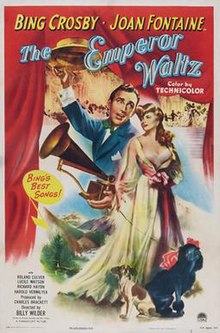The Emperor Waltz
| The Emperor Waltz | |
|---|---|

Theatrical release poster
|
|
| Directed by | Billy Wilder |
| Produced by | Charles Brackett |
| Written by |
|
| Starring | |
| Music by | Victor Young |
| Cinematography | George Barnes |
| Edited by | Doane Harrison |
|
Production
company |
|
| Distributed by | Paramount Pictures |
|
Release date
|
|
|
Running time
|
106 minutes |
| Country | United States |
| Language | English |
| Budget | $3.8 million |
| Box office | $4 million (US/ Canada rentals) |
The Emperor Waltz (German: Ich küsse Ihre Hand, Madame) is a 1948 American musical film directed by Billy Wilder and starring Bing Crosby and Joan Fontaine. Written by Wilder and Charles Brackett, the film is about a brash American gramophone salesman in Austria at the turn of the twentieth century who tries to convince Emperor Franz Joseph to buy a gramophone so the product will gain favor with the Austrian people. The Emperor Waltz was inspired by a real-life incident involving Franz Joseph I of Austria. Filmed on location in Jasper National Park in Canada, the film premiered in London, Los Angeles, and New York in the spring of 1948, and was officially released in the United States July 2, 1948. In 1949, the film received Academy Award nominations for Best Costume Design and Best Music, as well as a Writers Guild of America Award nomination for Best Written American Musical.
At the turn of the twentieth century, traveling salesman Virgil Smith takes multiple (Bing Crosby) journeys to Vienna, Austria hoping to sell a gramophone to Emperor Franz Joseph, whose purchase of the recent American invention could spur its popularity with the Austrian people. At the same time, Countess Johanna Augusta Franziska von Stoltzenberg-Stolzenberg (Joan Fontaine) and her father, Baron Holenia, are celebrating the fact their black poodle Scheherezade has been selected to mate with the emperor's poodle. As they depart from the palace, they meet Virgil and his white fox terrier Buttons, whose scuffle with Scheherezade leads to a discussion about class distinctions.
When Scheherezade experiences a nervous breakdown, she is treated by veterinarian Dr. Zwieback, who practices Freudian psychology, and he advises Johanna to force her dog to face Buttons in order to dissipate her fear. When the dogs are reunited, romantic sparks begin to fly between not only the animals but their owners as well. They begin to spend a great deal of time together, during which Scheherezade and the salesman's dog mate, unbeknownst to their owners.
...
Wikipedia
